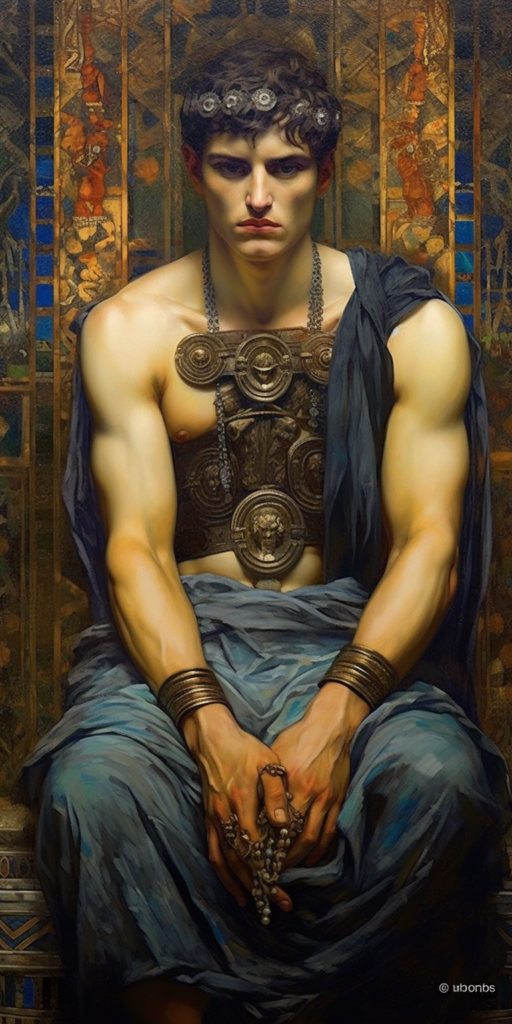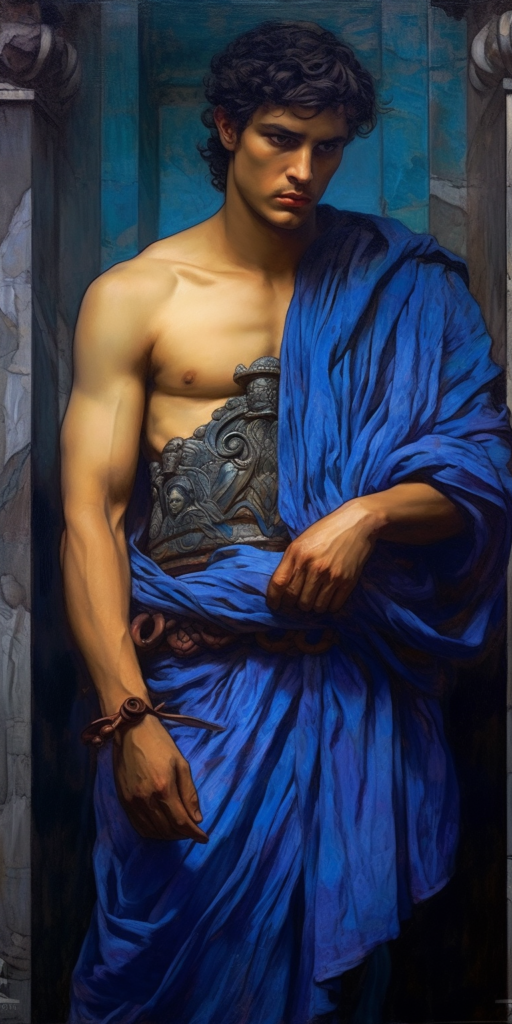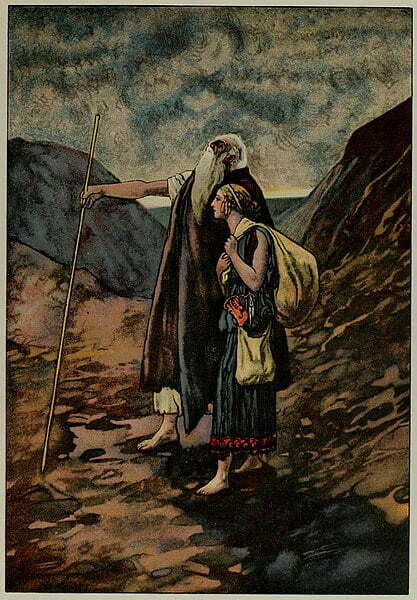King Oedipus, the Tragic Hero
Tragic hero cursed by fate, Oedipus, unwittingly fulfills a prophecy by killing his father and marrying his mother.

- Alias: King Oedipus
- Gender: Male
- Race: Human
- Occupation: King of Thebes
- Religion: Ancient Greek Mythology
- Allies: The people of Thebes, loyal advisors
- Enemies: The Sphinx, those who oppose his rule
- Abode/Base of Operations: Thebes, the royal palace
- Nationality: Theban
- Languages: Greek, Ancient Greek
- Alignment: Lawful Good
- Affiliation(s): The Kingdom of Thebes, the royal family
- Significant Others: Jocasta (wife and mother), Laius (father), Antigone and Ismene (daughters)
Oedipus, a renowned king of Thebes, is a complex and tragic figure driven by a relentless pursuit of truth and the desire to escape his cursed fate. With a regal presence and commanding stature, Oedipus possesses a noble air befitting his royal lineage. His piercing eyes, often filled with intensity and determination, reflect the depths of his inner turmoil.
From an early age, Oedipus was foretold by an oracle that he would kill his father and marry his mother. Unaware of his true parentage, he sets out on a journey to uncover the truth behind his origins, fueled by a burning need to understand his identity and break free from the grip of destiny. With unwavering determination, Oedipus embarks on a quest for knowledge, unwilling to let fear or doubt hinder his path.
As he delves deeper into the mysteries of his past, Oedipus uncovers a series of shocking revelations that send shockwaves through his kingdom. With each revelation, he becomes entangled in a web of tragic events, unwittingly fulfilling the prophecy he sought desperately to avoid. Despite the painful truths he uncovers, he remains resolute, driven by an insatiable thirst for self-discovery and a desire to protect his kingdom from further harm.
Throughout his journey, Oedipus displays a fierce intellect and a keen sense of justice. He possesses the ability to unravel complex riddles and solve intricate puzzles, a skill that proves invaluable in his quest for truth. He is a man of action, not hesitating to confront the most daunting challenges head-on, even when the consequences are devastating.
Though burdened by a tragic fate, Oedipus’s motivations are rooted in a genuine desire for self-awareness and the well-being of his people. His actions are driven by a sense of duty and responsibility as a leader, as he seeks to protect his kingdom from internal and external threats. Oedipus’s ultimate goal is to reconcile with his past, find redemption, and restore order to Thebes, despite the irreversible damage caused by his unwitting actions.
However, as the layers of his tragic destiny unravel, he grapples with the weight of his choices and the consequences they bring. He is a man tormented by his own fate, haunted by the realization that he cannot escape the prophecies that have dictated his life. Yet, even in the face of his own downfall, Oedipus maintains a sense of dignity and resilience, refusing to succumb to despair.
Oedipus is a regal figure with a commanding presence. He has a strong and athletic build, standing tall and proud. His chiseled features display a sense of wisdom and determination. He has a flowing mane of dark hair, slightly graying at the temples, framing a face that carries the weight of his responsibilities. His piercing eyes reflect a deep intelligence and a touch of sorrow, hinting at the struggles he has faced. Clad in regal attire, he carries himself with grace and authority, befitting his role as the ruler of Thebes.
In the end, Oedipus’s story serves as a cautionary tale about the perils of fate and the limitations of human agency. His journey embodies the struggle between free will and predestination, reminding us of the fragility of our own lives and the power of self-discovery, even in the face of insurmountable odds.
Oedipus, the Tragic Hero

Medium humanoid (human), lawful good
Armor Class: 17 (natural armor) Hit Points: 180 (20d8 + 90) Speed: 30 ft.
STR 18 (+4) DEX 14 (+2) CON 16 (+3) INT 16 (+3) WIS 14 (+2) CHA 20 (+5)
Saving Throws: Wisdom +7, Charisma +10 Skills: Insight +7, Perception +7 Damage Resistances: psychic Condition Immunities: charmed Senses: passive Perception 17 Languages: Common
Challenge: 15 (13,000 XP)
Actions – Oedipus has two short sword attacks.
- Short Sword. Melee Weapon Attack: +8 to hit, reach 5 ft., one target. Hit: 9 (1d6 + 4) piercing damage.
- Fated Strike. Melee Weapon Attack: +8 to hit, reach 5 ft., one target. Hit: 11 (2d6 + 4) piercing damage. If the target is a creature, it must succeed on a DC 15 Wisdom saving throw or become frightened until the end of its next turn.
- Blinding Truth. Melee Weapon Attack: +8 to hit, reach 5 ft., one target. Hit: 14 (2d8 + 5) slashing damage. If the target is a creature, it must succeed on a DC 15 Wisdom saving throw or be blinded until the end of its next turn.
- Fateful Insight. Oedipus gains advantage on his next attack roll or saving throw. This ability recharges after a short or long rest.
- Tragic Oracle. Oedipus speaks a prophetic verse, forcing each creature of his choice within 30 feet of him to make a DC 17 Wisdom saving throw. On a failed save, the creature takes 18 (4d8) psychic damage and is stunned until the end of its next turn. On a successful save, the creature takes half damage and isn’t stunned.
Reactions
Hubris Defiance. When Oedipus is hit by an attack that would reduce him to 0 hit points, he can use his reaction to make a DC 18 Charisma saving throw. On a success, he drops to 1 hit point instead and gains resistance to all damage until the start of his next turn.
Legendary Actions
Oedipus can take 3 legendary actions, choosing from the options below. Only one legendary action option can be used at a time and only at the end of another creature’s turn. Oedipus regains spent legendary actions at the start of his turn.
Blinding Strike. Oedipus makes one Blinding Truth attack.
Oracle’s Wisdom (Costs 2 Actions). Oedipus uses his Tragic Oracle ability.
Intervening Fate (Costs 3 Actions). Oedipus moves up to his speed without provoking opportunity attacks and can take the Dash action as a bonus action on this turn.
Equipment
- Sword of Fate: This magical longsword grants a +2 bonus to attack and damage rolls and deals an additional 1d6 psychic damage on a hit.
- Shield of Prophecy: This magical shield provides a +2 bonus to AC and grants advantage on saving throws against spells and magical effects.
- Cloak of Tragedy: This enchanted cloak grants advantage on Charisma (Persuasion) checks and Charisma saving throws.
Traits
Tragic Hero. Oedipus gains advantage on saving throws against being charmed. Additionally, when he rolls a natural 20 on an attack roll, the target takes an extra 10 psychic damage.
Blind Seer. Oedipus is immune to the blinded condition and has blindsight with a range of 30 feet.
Fated Protector. Oedipus can use a bonus action to grant himself or an ally within 30 feet resistance to all damage until the start of his next turn. This ability recharges after a short or long rest.
Legendary Resistance (3/Day). If Oedipus fails a saving throw, he can choose to succeed instead.
Lair Actions
On initiative count 20 (losing initiative ties), Oedipus can take a lair action to cause one of the following effects. Oedipus can’t use the same effect two rounds in a row:
- Glimpse of Destiny. He reveals a vision of a creature’s fate, forcing it to make a DC 17 Wisdom saving throw. On a failed save, the creature is frightened for 1 minute. It can repeat the saving throw at the end of each of its turns, ending the effect on a success.
- Echoes of Tragedy. He utters a haunting lament, forcing each creature within 30 feet of him to make a DC 17 Wisdom saving throw. On a failed save, the creature takes 18 (4d8) psychic damage and is unable to take reactions until the start of its next turn. On a successful save, the creature takes half damage and can still take reactions.
- Visionary Insight. He gains advantage on his next attack roll or saving throw. This effect lasts until the end of his next turn.
Appearance
Oedipus is a tall and noble-looking man with shoulder-length dark hair and piercing blue eyes. He wears regal armor adorned with symbols of his tragic destiny. Despite the weight of his past, his face reflects determination and a touch of sadness, hinting at the burdens he carries.
In Myth

Laius, Oedipus’ father, kidnapped, raped and beheaded the young boy Chrysippus and was then cursed by Chrysippus’ father, Pelops. The weight of this curse bore down onto Oedipus himself. An oracle prophesied that he would kill his father and marry his mother, Jocasta. Seeking to avoid such a fate, Laius was very careful with his wife Jocasta and did not touch her. Since Jocasta did not know of the prophecy, she felt she must have a child, for the only way for her to gain honour was to get pregnant.
When Oedipus was born, Lauis had the infant’s ankles pierced with a brooch and had him exposed on Mount Kithairon (placed in the wilderness to die). His soft-hearted servant, however, could not carry out Laius’ order and instead handed the boy to a shepherd who presented the child to King Polybus and Queen Merope (or Periboea) of Corinth, who raised him as their own son.
At a party thrown by King Polybus, a drunk guest called Oedipus a bastard. Seeking to confirm his lineage, not believing the man, Oedipus sought out the Oracle at Delphi. Instead of telling him his lineage, the Oracle related the same prophecy as was told to his father: that he would kill his father and marry his mother.
After descending the mountain, on a road where three roads meet, he met an unarmed man with a staff on his own pilgrimage, riding a chariot. The man in the chariot demanded that Oedipus stand aside so he could pass, finally hitting Oedipus with his staff. Oedipus, as the times permitted to defend oneself, killed the stranger and all but one of his entourage. The man he had killed, unknown to Oedipus, was King Laius, Oedipus’ real father.
Oedipus decided that the drunkard at the party was lying, and decided not to return home in order to avoid Polybus.
As he traveled, Oedipus encountered a mythical creature that was terrorizing Thebes. Oedipus saved the city by answering the riddle of the Sphinx. Q: “What walks on four legs in the morning, two legs in the afternoon, and three legs in the evening?” A: “Man, as a baby man crawls on four legs; as an adult walks on two legs; when old, man uses a cane.” (The answer to the Sphinx’s riddle applies to Oedipus more than any other man. As an infant with hobbled ankles, he had difficulty in learning to walk. As a blind man in old age, he depended on a cane.)
Since Oedipus answered the Sphinx’s riddle correctly, he was offered the now-vacant throne of Thebes and the now-widowed queen’s hand in marriage. Oedipus accepted both offers. Within a short time, divine signs of misfortune and pollution descended on Thebes.

The people of Thebes are begging the king for help; he must discover the cause of the plague. Oedipus swears to find the person responsible for the pestilence and execute him as well as anyone who aids him. He questions everyone in the palace, including his wife, Jocasta. Eventually, when the blind seer Tiresias informs Oedipus that he himself is both the source of the pollution and the murderer, the king does not believe him. Oedipus insists that the culprit is Creon, Jocasta’s brother, whom he believes is plotting to usurp the throne.
Oedipus then accuses Tiresias of lying and being a false prophet. It is not until a messenger arrives with news that King Polybus of Corinth (his supposed father) has died of natural causes that a horrified Oedipus finally solves the mystery of his birth. In a moment of recognition, he realizes that he has not only killed his own father but has also married his own mother (with whom he has had four children). When Jocasta learns the horrible truth, she hangs herself in the very chamber where she and her son have unknowingly committed incest. Seizing the brooches from her dress, Oedipus blinds himself.
Detective, murderer, judge, and jury, Oedipus condemns himself to wander in darkness throughout the land for the rest of his life.
Oedipus at Colonus and Antigone
When Oedipus stepped down as King of Thebes, he gave the kingdom to his two sons, Eteocles and Polynices, who both agreed to alternate the throne every year. However, they showed no concern for their father, who cursed them for their negligence. After the first year, Eteocles refused to step down and Polynices attacked Thebes with his supporters. Both brothers died in the battle. King Creon, who ascended to the throne of Thebes, decreed that Polynices was not to be buried.
Antigone, his sister, defied the order, but was caught. Creon decreed that she was to be buried alive, this in spite of her betrothal to his son Haemon. Antigone’s sister, Ismene, then declared she had aided Antigone and wanted the same fate. The gods, through the blind prophet Tiresias, expressed their disapproval of Creon’s decision, which convinced him to rescind his order, and he went to bury Polynices himself. However, Antigone had already hanged herself rather than be buried alive. When Creon arrived at the tomb where she was to be interred, Haemon attacked him and then killed himself. When Creon’s wife, Eurydice, was informed of their deaths, she too took her own life.
Oedipus becomes a wanderer, pursued by Creon and his men. He finally finds refuge at the holy wilderness right outside of Athens, where it is said that Theseus took care of him and his daughter. He died a peaceful death and his grave is said to be sacred to the gods.

 Buy me a coffee
Buy me a coffee